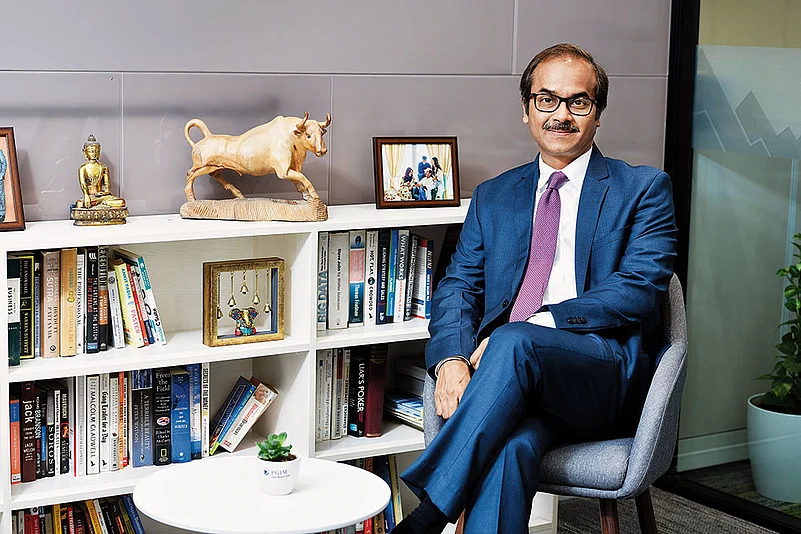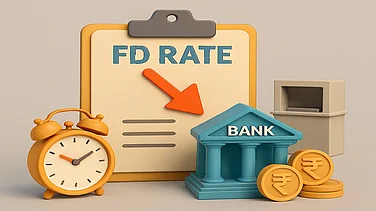It is not every day that a chief executive officer (CEO) quits the cushioned job at his prime. So when PGIM India Mutual Fund CEO Ajit Menon announced that he had decided to “retire” at age 55, the industry was taken by surprise and votaries of early retirement got a shot of inspiration for their much-criticised-as-a-nearly-impossible financial goal.
Menon has chosen to retire three years before the official retirement age of 58. He will continue to serve as the CEO till August 31, 2025, and, then as a senior advisor with the fund house till March 2026. PGIM India MF will get a new CEO in Abhishek Tiwari, who is currently the chief business officer in the fund house, from September 1, 2025.
Outlook Money spoke to Menon to find out how he did it and what he plans ahead. The conversation was peppered with lessons for those who plan to retire early.
Says Menon: “I took steps towards (retiring at) a specific age when my wife Alinaa and I formally began the financial planning process with our advisor. We started by clearly defining all our life goals. With our advisor’s help, we drew up our net worth at that time and reallocated our existing assets and both our incremental income streams accordingly. This involved selling real estate, repaying loans, monitoring our budget and addressing remaining financial gaps for our goals.”
Here are the main learnings from our recent conversation and other interactions we have had with him in the past.
The Planning Phase
Acknowledge The Goal: High income doesn’t guarantee early retirement, but a sharp focus and meticulous planning does.
When asked why he took the decision to retire at 55, he says: “I have simply followed the financial roadmap our family created with our advisor more than a decade ago.”
One of the things that helped him achieve the goal was that he made the decision early on. “The age of 55 was chosen at the outset as a benchmark, but being able to actually meet that target was a mix of planning, good career progression and my wife continuing at her venture. Ultimately, it’s the process of financial planning that deserves the credit—it’s the real enabler, more than just the plan itself,” he says.
Mindful spending, such as staying on rent to avail of tax benefits and buying pre-owned cars rather than overspend on a lavish lifestyle helped him save more and later buy a bigger house and a premium car without straining the finances
In a message before Outlook Money’s flagship 40After40 Financial And Retirement Planning Expo held in January 2024, Menon had said that retirement is the only financial goal for which you don’t get a loan, and with increasing longevity risk, it is important to start saving for it as early as possible.
Estimate Your Needs: If you want to retire early, the first step is to be clear about the lifestyle you want to maintain and what that will cost in the years after you retire. That will help you estimate the corpus you need to sustain.
Menon says: “The first step should be to estimate the corpus required to retire based on your current age and the age of retirement. Say, your current age is 30 and you wish to retire at 60, you have 30 years to accumulate your corpus. Calculate the monthly investment required from today to reach this corpus by 60. You can use a goal or retirement calculator for this.”
Be Smart About Your Investment Strategy: Mutual funds come in handy for retirement planning, as they offer a wide range of options to choose from and flexible investment modes, such as systematic investment plans (SIPs), the option to pause them, increase the amount, and so on. That’s why they were a large part of Menon’s investment strategy.
“We largely used mutual funds as the core allocation for various goals apart from considering our Provident Fund (PF) balances for future goals. We began with reducing overexposure to real estate and directing incremental income towards specific, pre-defined goals,” he says.
Budgeting Helps: One of the key advice that Menon shares is practising mindful spending instead of indulging in a lavish lifestyle. Interestingly, he practises what he preaches.
“We made some conscious lifestyle choices, such as living on rent to reap tax benefits and buying pre-owned cars—to save more without compromising on quality. These choices allowed us to afford a larger home and a premium vehicle without straining our finances,” says Menon.
Post-Retirement Planning
Being prepared for your retirement years financially is only one part of the jigsaw solved; the other and often more crucial part is managing the post-retirement years.
Have A Purpose: Early retirement is, typically, associated with having the time to yourself, but if you don’t define a clear sense of purpose for yourself, the time can stretch longer than you expected and come to bite you. “Being purposeful and working at something that gives you joy keeps you healthy into your later years,” says Menon.
He is looking forward to engaging more with hands-on activities, not just intellectual work. In this context, one late addition in his portfolio is a piece of land to help him staying engaged physically post retirement and pursue hobbies related to nature and gardening and community work. He says: “A small piece of farmland should help bring that vision to life. I also plan to earn a certification in executive coaching, especially since my wife is a Master Certified Coach which is an added advantage.”
It’s not just farming; he has a long list of to-dos. He will continue advising in areas he is passionate about, such as retail and retirement. “From working with friends contributing to our local farming community to diving back into creative pursuits, there’s a wide range of fulfilling work ahead. And of course, being present for loved ones remains a priority,” he says.
Retirement should not be seen only as a financial endpoint, but as a purposeful new chapter, he adds. “Pursue what brings you joy and meaning. Having even a modest role in income generation or ongoing engagement can greatly enhance your sense of fulfilment. If your mind is purposeful and happy, your body follows and stays healthy.”
Acquire or Hone New Skills: One advice around retirement is to not worry about the corpus, but build a secondary income, and Menon swears by it. “Retirement planning is not just about creating a corpus. A financial advisor can help you create this corpus. But the real risk is of ‘concentration’, which is that you are just dependent on one skill (job) for all your life,” he says.
Divide the retirement corpus in three buckets of 10 years each. For the first phase, invest in conservative products for stability; for the next 10 years, invest in hybrid funds for a balanced approach; for the last phase, go for diversified equity funds for growth
It is not uncommon for anxiety to set in among individuals who retire. Menon says: “One way to overcome retirement anxiety is to hone or acquire new skills early on so that you have the option of creating a secondary source of income. The skill can be a passion that you have held since your teenage years, such as becoming a fitness instructor, yoga teacher, translator, photographer and so on.” Develop and begin monetising secondary skills before retirement, he adds.
Maintain Your Health: Menon believes focusing on one’s health is as important as focusing on building a retirement corpus. The most common problem people typically encounter in there 60s and 70s is health related, he says.
That can be countered if one is focused on wellness and healthcare from an early age. “Maintaining your health helps you to reduce the cost of expenditure incurred on treatment,” says Menon.
Make Your Corpus work
The retirement corpus usually seems large enough, but it will only last if you are careful right from the beginning. Since inflation is the biggest enemy of a corpus that should ideally last for 20 years or more, it is important to reinvest a part of the corpus.
One way to do that is through the bucketing strategy, says Menon. He suggests that once you have accumulated your retirement corpus, it can be divided into three buckets to support a 30-year retirement horizon.
The first bucket should be invested in conservative products and designed to cover expenses for the initial 10 years. The second bucket, meant for the next 10 years, can be allocated to hybrid funds that offer a balanced approach. That means that you will take on only a little amount of risk for growth. The third bucket, intended for the final 10 years and beyond, can be invested in diversified equity funds.
“The beauty of this strategy lies in compounding. While you draw down funds from the first two buckets, the third bucket has 20 years to grow,” he says. That’s a fairly long horizon to get good results from equity investments, provided your choices have been right.
Menon’s journey is proof that with careful planning and disciplined execution, stepping away from work on your own terms, at your own time, is possible.
kundan@outlookindia.com















